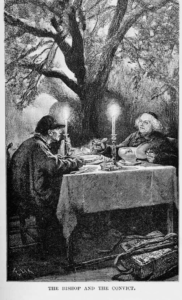We don’t know, and we may never know, how much President Donald Trump’s rhetoric influenced the white supremacist in El Paso who allegedly killed 22 people. What we do know is that Trump has done more than any politician in living memory to fan the flames of ethnic and racial antipathy and nurture a culture of bigotry.
A generation from now, when historians look back at the defining features of the Trump era, among the most prominent will be his dehumanizing rhetoric—the cruelty and virulence, the pulsating hate, the incitements to violence, and the effort to portray his targets as alien invaders, unworthy of dignity and respect, even subhuman.
It began at the dawn of his 2016 presidential campaign, when he described the undocumented workers coming across the border from Mexico as mostly rapists and drug dealers. It continued during the campaign, when Trump unleashed an attack on Gonzalo Curiel, a district-court judge presiding over a fraud lawsuit against Trump University, calling Curiel a “hater” who was being unfair to him because the judge is “Hispanic,” because he is “Mexican.” (Curiel was born in Indiana.) The Republican speaker of the House, Paul Ryan, referred to this as “the textbook definition of a racist comment.”
Trump claimed that Democrats want unauthorized immigrants, “no matter how bad they may be, to pour in and infest our Country.” And Trump’s closing argument leading up to the 2018 midterm election was that Central American migrants seeking asylum in the United States constituted “an invasion of our country.” Trump’s rhetoric of dehumanization set the stage for his policy of separating children from their families at the southern border. And it created the conditions that, earlier this year, as Vox’s Aaron Rupar wrote, “turned the idea of shooting migrants and asylum seekers who try to cross the southern border into a punchline.”
At this point only the truly devoted and the truly deceived can deny what is playing out. Donald Trump is doing as president what George Wallace did as governor of Alabama—using words to incite feelings of revulsion and detestation toward “the other,” men and women who are the “wrong” race or the “wrong” ethnicity. For Wallace, the primary targets were black people; for Trump, the primary targets have been both Hispanic and black. (“The two greatest motivators at [Dad’s] rallies were fear and hate,” Wallace’s daughter Peggy Wallace Kennedy recently said. “There was no policy solution, just white middle-class anger.” And she hears echoes of that in Trump’s rhetoric.”I saw daddy a lot in 2016,” she said, adding that “they both were able to adopt the notion that fear and hate are the two greatest motivators of voters that feel alienated from government.”)
Words have long held a treasured place in American political culture. When Americans call to mind their greatest presidents, they often think less of their policies than their words: Thomas Jefferson’s “All men are created equal”; Abraham Lincoln’s “With malice toward none, with charity for all”; Franklin D. Roosevelt’s “We have nothing to fear but fear itself”; John F. Kennedy’s “Ask not what your country can do for you; ask what you can do for your country”; and Ronald Reagan’s “Mr. Gorbachev, tear down this wall.”
Words can elevate our moral sentiments. They can articulate noble national goals, promote healing and understanding, stir people to stand against injustice, and galvanize the nation behind great causes. We use words to express our deepest longings and great loves. “I know nothing in the world that has as much power as a word,” the poet Emily Dickinson said.
But words can also wound, degrade, and humiliate. They can cultivate grievances and distort reality. And when words are used to inflame ugly passions, malignant and malicious forces can be unleashed. Even in America.
“This attack is a response to the Hispanic invasion of Texas,” said a manifesto that authorities believe was written by the man who gunned down 22 innocent souls in El Paso, and that was posted online 19 minutes before the killing spree began. The author said he was “simply defending my country from cultural and ethnic replacement brought on by an invasion.” He added, “The Hispanic population is willing to return to their home countries if given the right incentive. An incentive that myself and many other patriotic Americans will provide.”
In the best biography ever written of the first Republican president, Lord Charnwood said of Abraham Lincoln:
Perhaps not many conquerors, and certainly few successful statesmen, have escaped the tendency of power to harden or at least to narrow their human sympathies; but in this man a natural wealth of tender compassion became richer and more tender while in the stress of deadly conflict he developed an astounding strength.
Lord Charnwood said this of Lincoln as well:
This most unrelenting enemy to the project of the Confederacy was the one man who had quite purged his heart and mind from hatred or even anger towards his fellow-countrymen of the South.
The current Republican president, rather than purging his heart and mind from hatred, has instead filled them with hate—and the further tragedy is that the hate is not confined to his heart and mind alone.
Peter Wehner is a contributing editor at The Atlantic and a senior fellow at the Ethics and Public Policy Center. He writes widely on political, cultural, religious, and national-security issues, and he is the author of The Death of Politics: How to Heal Our Frayed Republic After Trump.


